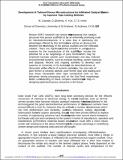Development of tailored porous microstructures for infiltrated catalyst electrodes by aqueous tape casting methods
Abstract
Recent SOFC research has shown that impregnating fine catalyst structures into porous scaffolds to be an extremely promising route for electrode development. It is clear that in optimising the advantages offered by this technique there will be an obvious link between the morphology of the porous scaffold and the infiltrated catalyst. There are significant potential benefits to using aqueous systems for the manufacture of the scaffold. They include the potential for a far larger range of pore formers which may be employed to create specific pore morphologies and also reduced environmental burdens, such as exhaust handling, worker exposure and disposal. Recent and ongoing activities to develop such systems at University of St Andrews will be described. Areas of discussion will be effects of ceramic particle size, the size ratio of pore former to ceramic particle, pore former type and loading and how these interact with other tape constituents both on the behaviour during processing and on the final fired morphology. Better understanding of these complex relationships will help in designing optimised porous structures in the future.
Citation
Cassidy , M , Doherty , D J , Yue , X & Irvine , J T S 2015 , Development of tailored porous microstructures for infiltrated catalyst electrodes by aqueous tape casting methods . in K Eguchi & S C Singhal (eds) , 14th International Symposium on Solid Oxide Fuel Cells, SOFC 2015 . ECS Transactions , no. 1 , vol. 68 , Electrochemical Society , pp. 2047-2056 . https://doi.org/10.1149/06801.2047ecst
Publication
14th International Symposium on Solid Oxide Fuel Cells, SOFC 2015
ISSN
1938-5862Type
Conference item
Rights
© The Electrochemical Society, Inc. 2015. All rights reserved. Except as provided under U.S. copyright law, this work may not be reproduced, resold, distributed, or modified without the express permission of The Electrochemical Society (ECS). The archival version of this work was published here: https://dx.doi.org/10.1149/06801.2047ecst
Description
The authors acknowledge the EPSRC Hydrogen and Fuel Cells Supergen Fuels Cells Challenge Programme project EP/M014304/1 “Tailoring of microstructural evolution in impregnated SOFC electrodes” and the University of St Andrews for funding this work.Collections
Items in the St Andrews Research Repository are protected by copyright, with all rights reserved, unless otherwise indicated.

